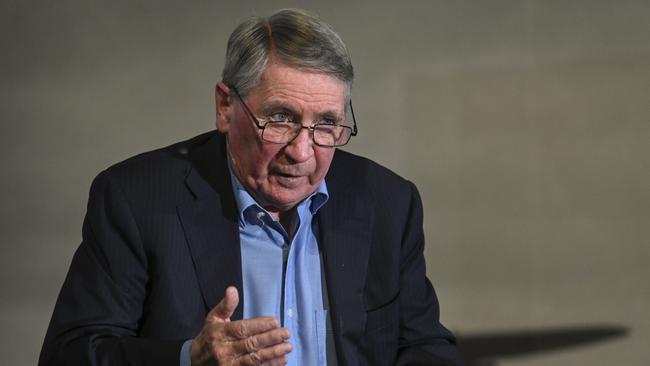Defending Australia: Former Defence boss Dennis Richardson warns AUKUS nuclear subs will require greater ‘political will’
Former Defence boss Dennis Richardson has expressed concern there is insufficient political will behind the acquisition of nuclear submarines, and says defence spending must rise to 3 per cent of GDP.

One of the nation’s leading security experts, Dennis Richardson, has warned there is “no real consensus” on defence “across the body politic” and pushed for military spending to be increased to 3 per cent of GDP.
Speaking at News Corps’ Defending Australia conference at the Australian War Memorial, Mr Richardson – a former head of the Defence Department and Department of Foreign Affairs and Trade – expressed concern there was insufficient political will behind the plan for Australia to acquire nuclear-powered submarines under the AUKUS arrangement.
Speaking on a panel at the summit, Mr Richardson said the major parties tended to “pretend” there was a consensus on defence. But he warned the initiative to acquire nuclear-powered submarines needed to be a national enterprise, as called for by South Australian Premier Peter Malinauskas.
“There’s already a whispering campaign against nuclear-powered submarines,” Mr Richardson said. “It will be too hard, it’s too complex, something will happen with Trump, the Brits can’t be trusted. You’ve already got that as backfill.
“Of course we can do it (acquire nuclear submarines) … It’s simply a question of political will and determination and perseverance.”
Mr Richardson, a former head of ASIO and a previous Australian ambassador to the United States, said it would “take the body politic to be equally committed across the two parties” to realise the vision.
He also warned that neither side of politics was being “entirely honest with the Australian people’’ about how much defence spending would need to increase to make the submarines a reality.
“The acquisition of nuclear-powered submarines as we move through the 2030s – we will require probably about 3 per cent of GDP (spending on defence),” Mr Richardson said.
He said the discussion about greater defence spending needed to begin now and echoed comments from Paul Dibb – seen as the father of Australia’s modern defence policy – that the defence force was too small.
Mr Richardson said parties would need to stop changing capability decisions made by previous governments after taking office, warning it was important to “just stick with it”.
“It’s important for both sides of politics to stick to capability decisions when they are made … (instead of) this business about changing everything when you come into office,” he said. “Let’s not change it.”
One of the co-authors of the Defence Strategic Review, Peter Dean, warned that moves by the Albanese government to limit the number of international students coming into the country could also risk other efforts at statecraft.
“Structurally I … think we need a national security strategy that integrates all asks of government,” he said. “We need to get a bit more serious when it comes to integrated statecraft. Cutting the number of international students … without having a conversation around that is not having integrated statecraft.”
He said Australia also needed to move “much faster” on defence capabilities and argued that it couldn’t just be left to South Australia and Western Australia.
“In the US and the UK to get submarines built, they are outsourcing more and more companies across US states and counties across the UK,” he said.
He added that without obtaining a significant “air missile defence capability”, Australia was “not serious” about the China threat.
Professor Dibb, a former Defence Department deputy secretary, said Australia had a “very professional … peacetime defence force” rather than one ready for a wartime era.
Mr Richardson said the same urgency that was seen during the Covid-19 pandemic – when companies were able to quickly ramp up the domestic manufacturing of respirators – was needed in defence.
He added that it was “hard to see” how Australia would not participate in a conflict involving Taiwan, China and the US.



To join the conversation, please log in. Don't have an account? Register
Join the conversation, you are commenting as Logout